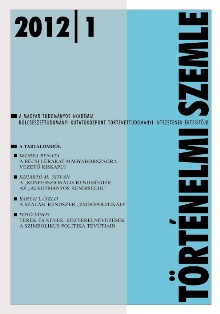Magyary Zoltán és a magyar alkotmányosság
Zoltán Magyary and the Hungarian Constitutional Tradition
Author(s): Miklós SzalaiSubject(s): History
Published by: Magyar Tudományos Akadémia Bölcsészettudományi Kutatóközpont Történettudományi Intézet
Summary/Abstract: This article investigates the work of Zoltán Magyary, one of the most outstanding personalities of the Hungarian political science and jurisprudence between the two World Wars, from a new, until now rather concealed point of view: it explores Magyary’s attitude toward the far right, the fascism. Magyary represented more modern views and ideas than the official mainstream of Hungarian political thought. While the official ideology of the era was a Hungarian nationalism of a historical-constitutional sort, based on the idea of the „millennial Hungarian constitution”, Magyary followed the new trends of the theory of administration and political science, developed after the First World War, and he wanted to transplant these new ideas in the Hungarian administration too. He considered the losing ground of both the laissez faire market economy and the parliamentarism in the modern society, as inevitable consequences of the tendencies in the development of the life of states, and he had the view that as a result the executive power becomes stronger, and intervenes into the economic life, following its own professional motives against the waves of public opinion and the ossified traditions of the state too. This line of thought led Magyary gradually to the total rejection of the idea of parliamentarism and democracy. Because in Hungary only the fascism represented the idea of strong state and etatism, Magyary in the end of the 1930’s came near to the far right, first and foremost to Béla Imrédy and his party, who demanded the full abolition of the – even until that rather ambiguous – parliamentary character of the Hungarian state, and the establishment of a fascist-type corporate-, or Führer-state. Although Magyary sincerely admired the Nazi Germany’s efforts of modernization and war, his thought was pushed toward the far right not by these, but by the theoretical considerations described above. But it is also belongs to the truth, that Magyary never identified himself with the most inhumane components of the fascist ideology: with the racism and the anti-Semitism.
Journal: Történelmi Szemle
- Issue Year: 2012
- Issue No: 01
- Page Range: 83-101
- Page Count: 19
- Language: Hungarian

